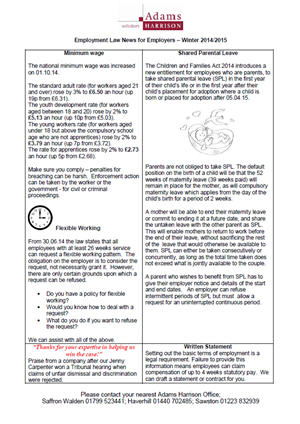The Children and Families Act 2014 (CFA 2014) inserts new provisions into Part 8 of the Employment Rights Act 1996 (ERA 1996) (Chapter 1B, sections 75E to 75K) to introduce a new entitlement for employees who are parents (whether by birth or adoption), to take shared parental leave (SPL) in the first year of their child’s life or in the first year after their child’s placement for adoption (see The SPL period). The provisions of the CFA 2014 are supported by regulations. Parents will not be obliged to take SPL once the new scheme comes into force. The default position on the birth of a child will be that the 52 weeks of maternity leave (39 weeks paid) will remain in place for the mother, as well as compulsory maternity leave (www.practicallaw.com/5-200-3103), which applies from the day of the child’s birth. The default position on the adoption of a child will be that the primary adopter will be entitled to 52 weeks of adoption leave (39 weeks paid). Changes will be made to adoption leave and pay to make them similar to the maternity leave and pay regime. Additional paternity leave and pay will not be available in respect of babies whose EWC is on or after 5 April 2015, or for children who are placed for adoption on or after that date (section 125, CFA 2014). Unless parents qualify for and opt into the SPL scheme the only entitlement that the child’s other parent will have will be two weeks’ ordinary paternity leave and pay. However, additional paternity leave and pay will remain in place for parents of children with an EWC before 5 April 2014, and for children placed for adoption before that date. As a result, the system of additional paternity leave and pay will remain in operation until mid-April 2016.
When does SPL come into force?
The SPL Regulations came into force on 1 December 2014 and the scheme for SPL apply where:
- The expected week of childbirth (EWC) begins on or after 5 April 2015.
- A child is placed for adoption on or after 5 April 2015.
How will the right to take SPL work?
The new scheme will make up to 50 weeks of SPL and 37 weeks of ShPP available for eligible parents to take or share (that is, everything other than the compulsory maternity leave period or an equivalent two-week period in adoption cases). A mother or primary adopter will be able to end their maternity or adoption leave, or commit to ending it at a future date, and share the untaken leave with the other parent as SPL. This will enable mothers and primary adopters to return to work before the end of their leave without sacrificing the rest of the leave that would otherwise be available to them. SPL can either be taken consecutively or concurrently, as long as the total time taken does not exceed what is jointly available to the couple. It appears that the key to success of the SPL scheme, particularly where both parents are employees and wish to take SPL, will be early discussion of proposals with employers.
Evidence that an employer may request
An employer that receives a notice of entitlement and intention to take SPL may request a copy of the child’s birth certificate or documents notifying the primary adopter that the child was to be placed with them, together with the name and address of the other parent’s employer.
Jennifer Carpenter became Managing Partner of the firm in January 2014. She was appointed as a Partner in January 2005, having qualified as a solicitor in 2000 after completing her training with the firm. She specialises in Employment, property dispute litigation and contentious probate. She has extensive experience of undertaking advocacy in the Magistrates Court, County Court and Employment Tribunals. Jennifer is also our Compliance Officer for Finance and Administration (COFA) and our Data Protection Officer.






